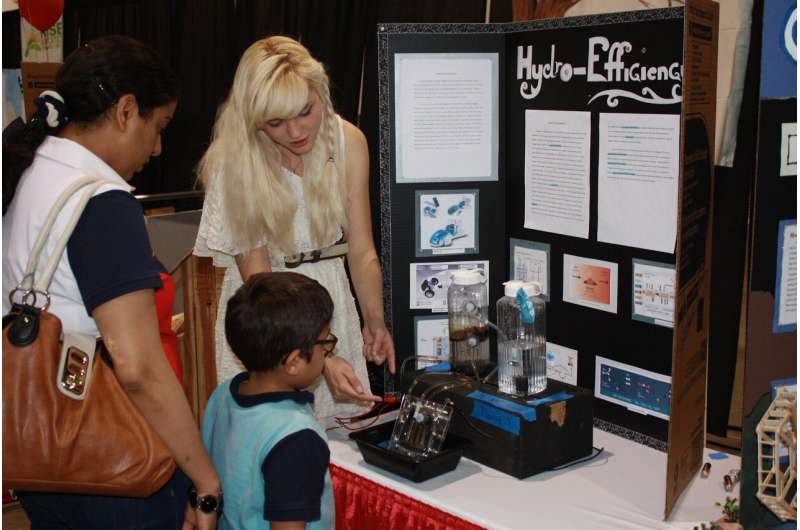
An educational science program run by the University of York’s Centre for Industry Education Collaboration has shown itself to have had a significant positive impact on children’s attitudes towards science and industry, according to the results of a study.
More than 500 children were asked a series of questions assessing attitudes to science, as part of the study. Out of the 12 questions, all but two showed increased positive responses from pupils. In particular, the number of children who stated “Science is my favorite subject” and “Id like to be a scientist” significantly increased after participating in the Children Challenging Industry (CCI) program.
Responded positively
Some of the most significant increases in the number of children who responded positively to the statement “Industry is useful,” which saw an increase by 33.5 percentage points and “Our lives would be worse without industry,” where positive responses increased by 20.5 percentage points.
CCI is a science education program delivered in collaboration with STEM companies and aimed at primary school children and teachers. The program, developed and delivered by the Centre for Industry Education Collaboration (CIEC) at York, engages children aged 9–11 in hands-on, problem-solving activities set in real-life industrial contexts and offers professional development for teachers.
Since the CCI program began in 1996, 62,000 children from 2,100 primary schools predominantly in Yorkshire, the North East, North West, Humber, East of England and Yorkshire have participated in practical classroom sessions and associated interactive visits to industry.
The findings of the study have been published in the International Journal of Science Education.
Industry-focused
The Director of the Centre for Industry Education Collaboration, Joy Parvin, said, “I have been involved in the program since 1996, and I am very proud of all the research and evaluation we have carried out since that time, and especially of the team of researchers and teachers who have worked on this project over the years. This has enabled 62,000 children to participate in this highly interactive program, carrying out industry-focused science activities not just in the classroom, but on industrial sites around the country, in partnership with STEM professionals from our many industry partners.”
Dr. Maria Turkenburg-Van Diepen, a Research Associate at the University of York, added, “Prior to this study, there was very little research literature about the interaction between primary schools—their teachers and pupils—and local industries. I am so glad the Children Challenging Industry paper is finally here.”
In 1989, England introduced a mandatory national science curriculum for primary schools, recognizing its early education importance. Yet, research reveals many children lose interest in STEM by age 11.
The CCI program consists of a unique combination of components designed to place curriculum science in a real-world context. It aims to improve knowledge about and attitudes towards STEM-focused industry, pupils’ attitudes towards science and STEM careers.
Manufacturing companies
A crucial component of the program is the link to local science-based manufacturing companies through site visits or industry STEM professionals visiting schools. The classroom activities are delivered by a CIEC advisory teacher, who also gives training for classroom teachers and provides guidance, lesson plans, and all necessary equipment. Teachers are then given free access to the program’s resources, which are tailored to the company visited and to the curriculum stage of the pupils.
Dr. Charlotte Evans, Chair of the CIEC’s Research Advisory Group, and Senior Lecturer University of Leeds (retired), noted, “There are few programs available to schools and pupils that are as successful as Children Challenging Industry in improving children’s positive attitudes towards Science and Industry. I would love to see these wonderful opportunities provided to all primary school children in the UK.”
Uniquely, the program uses industrial contexts to enhance pupils’ knowledge and experience of working scientifically. Investigations are based on problems encountered within science-based companies, reflecting how science is carried out in real life.
This approach has shown to improve children’s attitudes towards the positive impact of industry on society and also increased the number of children who would consider a career working in industry.
Valuable insights
Dr. Agata Lambrechts (University of York) and Dr. Estelia Bórquez-Sáznchez (University of Glasgow) contributed to the published research. Dr. Lambrechts said, “This collaborative effort, alongside colleagues involved in the design, delivery and evaluation of the program over the years, has resulted in valuable insights into fostering a love for science, industry, and future careers in (very) young minds across the country. It’s exciting to share this work with the world.”
Dr. Bórquez-Sánchez added, “The Children Challenging Industry (CCI) program has provided a new framework for young learners and science teachers, offering unique opportunities in the STEM field to develop their skills and contributing to scientifically literate citizens’ development. It would be great to see other primary educational contexts explore the benefits of joining the CCI community.”
More information:
Estelia Bórquez-Sánchez et al, Children Challenging Industry: improving young pupils’ engagement with science through links with industry, International Journal of Science Education (2024). DOI: 10.1080/09500693.2024.2375459
Provided by
University of York
Citation:
New research shows the success of a university-led science education program (2024, July 31)
retrieved 31 July 2024
from https://phys.org/news/2024-07-success-university-science.html
This document is subject to copyright. Apart from any fair dealing for the purpose of private study or research, no
part may be reproduced without the written permission. The content is provided for information purposes only.
